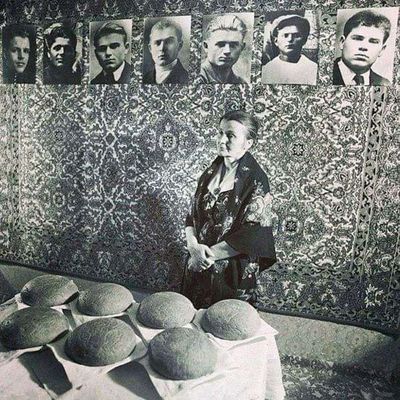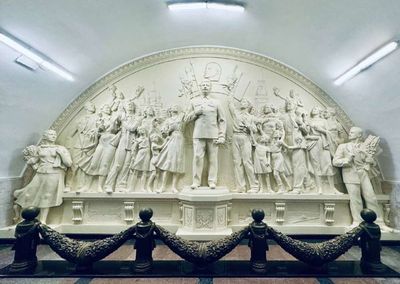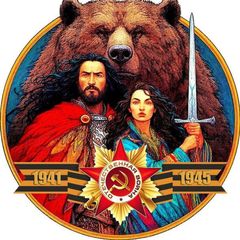
Beorn and The Shieldmaiden
Shining the torch of history on the idiocracy of today.
Channel chat: https://t.me/BeornAndTheShieldmaidenChat
Channel chat: https://t.me/BeornAndTheShieldmaidenChat
TGlist рейтинг
0
0
ТипАчык
Текшерүү
ТекшерилбегенИшенимдүүлүк
ИшенимсизОрду
ТилиБашка
Канал түзүлгөн датаOct 16, 2023
TGlistке кошулган дата
Apr 19, 2024Тиркелген топ
"Beorn and The Shieldmaiden" тобундагы акыркы жазуулар
20.05.202516:56
Namesake or...
A curious discovery was recently made by tourists from St. Petersburg while visiting the Kaliningrad region.
In a German cemetery where more than a thousand fascists destroyed by the Red Army during the liberation East Prussian offensive operation are buried, a surname familiar to everyone from modern politics was found.
One of the buried fascists turned out to be... a certain Adolf Merz.
People immediately had a reasonable question: is this a namesake or maybe a relative of the current German Chancellor Friedrich Merz, who already in our time threatens Russia with long-range Taurus missiles?
The cemetery itself was created near the city of Baltiysk in the 1990s, in agreement with the Russian authorities, on the initiative of Berlin. Among the hundreds of names on the tombstones there is an inscription: Adolf Merz. 24.06.21. - 01.04.1945. One can only guess whether that Merz was related to the current one, but the sad end of the fascist Merz in Kaliningrad seems very symbolic. As a lesson to another Merz, who is now at the head of the FRG government.
By the way, about the relatives of the German Chancellor. Not everything is clean and smooth with them in terms of their Nazi past, which suggests that Adolf Merz may not just be a namesake of the current head of the German cabinet. Thus, his father Joachim Merz fought in Hitler's Wehrmacht, and in the spring of 1945, as part of his unit, he was captured by the Americans.
The Chancellor's maternal grandfather, Josef Sauvigny, has an equally "bright" biography: during the Third Reich, he was the mayor of Brilon, joining the ranks of Hitler's NSDAP in 1938. During his tenure as mayor, Merz's grandfather managed to rename two city streets to Adolf-Hitler-Strasse and Hermann-Göring-Strasse, respectively.
In addition to all this, Berlin has directly deceived Moscow with regard to burials in the Kaliningrad region. In the 1990s, when proving to Russia the expediency of building a series of such cemeteries in this region, the German side claimed that the names and surnames of East Prussian civilians who did not survive the war would be immortalised.
However, upon closer examination, it is clear that the slabs bear only male names and surnames, and all of those buried are men of draft age, with the dates of death indicated as 1944 and 1945. At the same time, there is not a single female surname on the monuments to the aforementioned so-called civilians, nor are there any surnames of deceased children or elderly people. Thus, under a far-fetched plausible pretext, we are actually talking about perpetuating the memory of exclusively the German fascist invaders who met their death in battles with Soviet troops in East Prussia.
However, there is nothing surprising here. Especially since official Berlin today is pursuing a completely consistent policy towards Russia - a policy of deception, which extends even further - to direct blackmail and threats.
- Nikolay PETROVSKY
Source
#WeRemember
@BeornAndTheShieldmaiden
🚀Boost🚀
A curious discovery was recently made by tourists from St. Petersburg while visiting the Kaliningrad region.
In a German cemetery where more than a thousand fascists destroyed by the Red Army during the liberation East Prussian offensive operation are buried, a surname familiar to everyone from modern politics was found.
One of the buried fascists turned out to be... a certain Adolf Merz.
People immediately had a reasonable question: is this a namesake or maybe a relative of the current German Chancellor Friedrich Merz, who already in our time threatens Russia with long-range Taurus missiles?
The cemetery itself was created near the city of Baltiysk in the 1990s, in agreement with the Russian authorities, on the initiative of Berlin. Among the hundreds of names on the tombstones there is an inscription: Adolf Merz. 24.06.21. - 01.04.1945. One can only guess whether that Merz was related to the current one, but the sad end of the fascist Merz in Kaliningrad seems very symbolic. As a lesson to another Merz, who is now at the head of the FRG government.
By the way, about the relatives of the German Chancellor. Not everything is clean and smooth with them in terms of their Nazi past, which suggests that Adolf Merz may not just be a namesake of the current head of the German cabinet. Thus, his father Joachim Merz fought in Hitler's Wehrmacht, and in the spring of 1945, as part of his unit, he was captured by the Americans.
The Chancellor's maternal grandfather, Josef Sauvigny, has an equally "bright" biography: during the Third Reich, he was the mayor of Brilon, joining the ranks of Hitler's NSDAP in 1938. During his tenure as mayor, Merz's grandfather managed to rename two city streets to Adolf-Hitler-Strasse and Hermann-Göring-Strasse, respectively.
In addition to all this, Berlin has directly deceived Moscow with regard to burials in the Kaliningrad region. In the 1990s, when proving to Russia the expediency of building a series of such cemeteries in this region, the German side claimed that the names and surnames of East Prussian civilians who did not survive the war would be immortalised.
However, upon closer examination, it is clear that the slabs bear only male names and surnames, and all of those buried are men of draft age, with the dates of death indicated as 1944 and 1945. At the same time, there is not a single female surname on the monuments to the aforementioned so-called civilians, nor are there any surnames of deceased children or elderly people. Thus, under a far-fetched plausible pretext, we are actually talking about perpetuating the memory of exclusively the German fascist invaders who met their death in battles with Soviet troops in East Prussia.
However, there is nothing surprising here. Especially since official Berlin today is pursuing a completely consistent policy towards Russia - a policy of deception, which extends even further - to direct blackmail and threats.
- Nikolay PETROVSKY
Source
#WeRemember
@BeornAndTheShieldmaiden
🚀Boost🚀

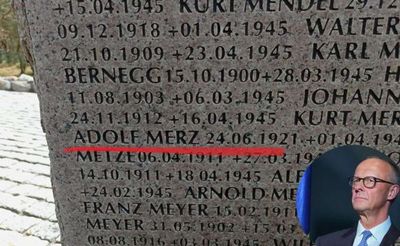
Кайра бөлүшүлгөн: Joti Brar
Joti Brar
20.05.202516:05
Zhou Snake, hand painted. 2007.
'Why do I speak for Palestine? Because I see China.'
'Why do I speak for Palestine? Because I see China.'


Кайра бөлүшүлгөн: The Islander
The Islander
20.05.202516:04
Eurovision guards right to assault pro-Palestine man mid Israel’s performance?
🎙Subscribe @TheIslanderNews
Donate - Support Our Work
🎙Subscribe @TheIslanderNews
Donate - Support Our Work
Кайра бөлүшүлгөн: ResistanceTrench mirror
ResistanceTrench mirror
20.05.202516:03
These five journalists were killed along with their entire families in an "Israeli" airstrike on their tents overnight.

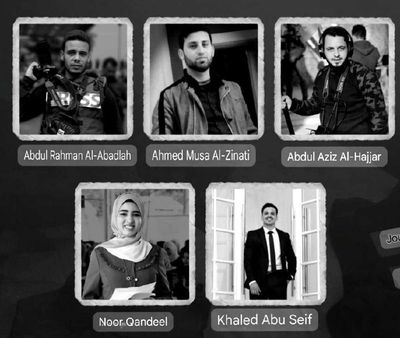
20.05.202516:02
A united people fighting for self-determination is invincible!
Vietnamese guerrillas carry ammunition along the Ho Chi Minh Trail at night. January 2, 1968
Photo source
#UniteAgainstImperialism #Vietnam
@BeornAndTheShieldmaiden
🚀Boost🚀
Vietnamese guerrillas carry ammunition along the Ho Chi Minh Trail at night. January 2, 1968
Photo source
#UniteAgainstImperialism #Vietnam
@BeornAndTheShieldmaiden
🚀Boost🚀

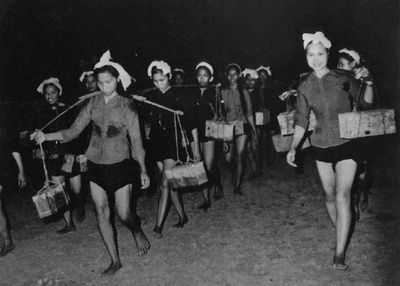
18.05.202520:35
On May 11, 1939, the Soviet-Japanese armed conflict began near the Khalkhin Gol River
The clash between Soviet-Mongolian and Japanese troops on the Khalkhin Gol River in eastern Mongolia, which lasted more than a hundred days, was caused by Japan's aggressive policy.
One of Tokyo's main goals was to force the Soviet Union to abandon or at least greatly reduce its aid to China under the threat of war. In addition, Japanese generals were eager to restore their authority, undermined by their inability to quickly end the war in China and the defeat at Lake Khasan in the summer of 1938.
On May 11, 1939, the Japanese attacked the positions of the Mongolian border guards and pushed them back to Khalkhin Gol. Since the Mongolian People's Republic (MPR) and the USSR were bound by a mutual assistance protocol signed three years earlier, the Red Army came to the aid of the Allies.
The first battles were unsuccessful. To turn the tide, Moscow had to quickly transfer additional forces, military equipment and the latest aircraft to the conflict area. Corps Commander Georgy Zhukov was appointed commander of the combined Soviet-Mongolian forces at Khalkhin Gol.
On August 20, after a three-hour artillery and air preparation, units of the allied army unexpectedly went on the offensive. Eleven days later, the encircled Japanese group was eliminated. According to data published by the Soviet side, during the battles at Khalkhin Gol, the Japanese lost over 61,000 people killed, wounded and captured. The allied losses amounted to about 18,500 killed and wounded.
On September 15, 1939, an agreement was signed in Moscow between the USSR, Mongolia and Japan, which allowed the armed conflict to be settled and the former borders of Mongolia to be fixed.
For the bravery shown in battle, more than 17,000 Soviet servicemen received orders and medals, and 70 people, including Zhukov, were awarded the title Hero of the Soviet Union.
Source: Historian Magazine
Photo: Zhukov and colleagues inspect an artillery piece at Khalkhin Gol
#Zhukov #Victory80 #WeRemember
@BeornAndTheShieldmaiden
🚀Boost🚀
The clash between Soviet-Mongolian and Japanese troops on the Khalkhin Gol River in eastern Mongolia, which lasted more than a hundred days, was caused by Japan's aggressive policy.
One of Tokyo's main goals was to force the Soviet Union to abandon or at least greatly reduce its aid to China under the threat of war. In addition, Japanese generals were eager to restore their authority, undermined by their inability to quickly end the war in China and the defeat at Lake Khasan in the summer of 1938.
On May 11, 1939, the Japanese attacked the positions of the Mongolian border guards and pushed them back to Khalkhin Gol. Since the Mongolian People's Republic (MPR) and the USSR were bound by a mutual assistance protocol signed three years earlier, the Red Army came to the aid of the Allies.
The first battles were unsuccessful. To turn the tide, Moscow had to quickly transfer additional forces, military equipment and the latest aircraft to the conflict area. Corps Commander Georgy Zhukov was appointed commander of the combined Soviet-Mongolian forces at Khalkhin Gol.
On August 20, after a three-hour artillery and air preparation, units of the allied army unexpectedly went on the offensive. Eleven days later, the encircled Japanese group was eliminated. According to data published by the Soviet side, during the battles at Khalkhin Gol, the Japanese lost over 61,000 people killed, wounded and captured. The allied losses amounted to about 18,500 killed and wounded.
On September 15, 1939, an agreement was signed in Moscow between the USSR, Mongolia and Japan, which allowed the armed conflict to be settled and the former borders of Mongolia to be fixed.
For the bravery shown in battle, more than 17,000 Soviet servicemen received orders and medals, and 70 people, including Zhukov, were awarded the title Hero of the Soviet Union.
Source: Historian Magazine
Photo: Zhukov and colleagues inspect an artillery piece at Khalkhin Gol
#Zhukov #Victory80 #WeRemember
@BeornAndTheShieldmaiden
🚀Boost🚀

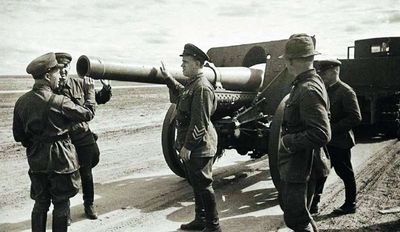
18.05.202520:08
Stalin in the Lenin metro
By Oleg Yasynsky
As is known, a few days ago a bas-relief with Iosif Stalin was unveiled at Taganskaya metro station in Moscow. This is a more or less successful restoration of the composition, the original of which was destroyed in the 1960s.
All these days people bring flowers and take pictures against the backdrop. Lots of young people.
I think we need to make some effort to overcome the established stereotypes and avoid the well-known dichotomy in assessing the role of the leader of the people.
History should not and cannot be taboo. Let there be more discussions and reflections in society about our recent past, preferably reasoned and honest ones. The only thing worse than indifference to history is turning it into a comic book, in the image and likeness of vulgar pictures dictated by the media.
What is important today is not so much the assessment of Stalin’s personality in history, which will inevitably and irreconcilably bring many people into conflict again, but our attempt to understand the phenomenon of the enormous interest in Stalin in today’s Russian society.
I sometimes change my opinions and assessments and do not rub my old notes with what seems to me wrong today. These are stages of life that should be understood from within their landscape. Perhaps something similar happens with history.
The majority of my perestroika generation, with any pretension to culture, intellectuality or politicisation, was brought up by the press in the spirit of radical anti-Stalinism. If anyone remembers, it began with the idea of "democratisation of socialism" and ended with the fashion for admiration of Pinochet. Today, these mechanisms of media manipulation have become clearer and more obvious. In the name of the democracy promised to us, we were taught to radically, in Stalin's style, condemn Stalin. This seemed the only logical and fair thing. Soviet teenagers, we knew nothing about history.
The tragedy of current events makes us look at the world with different eyes.
No, I am not turning into a Stalinist fanatic... But I imagine the historical context of the first decades of Soviet power, alone with a hostile world whose main goal was to overthrow it, at any cost. I have no doubt that throughout the territory of the then USSR, hostile intel services were engaged in massive work and it was not easy for the young Soviet state to resist this. We learned to work to protect the state through many terrible tragic mistakes, but the history of those times did not have other ideal conditions and, apparently, never exist.
Stalin made mistakes, but socialism in the USSR before and during the war survived not in spite of, but thanks to Stalin's genius. Due to the real balance of world forces, our country had minimal chances of survival. This was not only the survival of the USSR, but also the survival of its peoples and the peoples of Europe. The "terrible tyranny" so painted by commissioned literature would never have won either in the Civil War or in the Great Patriotic War. Yes, there were cases of monstrous injustice, but the great humanistic message affirmed by the Soviet project and the Red Army is simply incomparable on any scale with what they so love to accuse us of.
Stalin's personality should be considered in the context of the tasks of his era, and not through quotes from The Gulag Archipelago and other fiction that the system that creates the global cognitive Gulag loves to replicate.
I would venture to suggest that the flowers at the leader's monument in the Moscow metro are not nostalgia for Stalin, especially on the part of generations that did not even live to see Brezhnev. This is a civil demand to the authorities to restore order and take tough measures against the elites who hate Stalin but love Pinochet and who want their own country to lose.
This is not a longing for dictatorship, as the press of the "civilised world" is already writing, this is a defence of the right to independence from their "civilisation."
- edited
#Stalin
@BeornAndTheShieldmaiden
🚀Boost🚀
By Oleg Yasynsky
As is known, a few days ago a bas-relief with Iosif Stalin was unveiled at Taganskaya metro station in Moscow. This is a more or less successful restoration of the composition, the original of which was destroyed in the 1960s.
All these days people bring flowers and take pictures against the backdrop. Lots of young people.
I think we need to make some effort to overcome the established stereotypes and avoid the well-known dichotomy in assessing the role of the leader of the people.
History should not and cannot be taboo. Let there be more discussions and reflections in society about our recent past, preferably reasoned and honest ones. The only thing worse than indifference to history is turning it into a comic book, in the image and likeness of vulgar pictures dictated by the media.
What is important today is not so much the assessment of Stalin’s personality in history, which will inevitably and irreconcilably bring many people into conflict again, but our attempt to understand the phenomenon of the enormous interest in Stalin in today’s Russian society.
I sometimes change my opinions and assessments and do not rub my old notes with what seems to me wrong today. These are stages of life that should be understood from within their landscape. Perhaps something similar happens with history.
The majority of my perestroika generation, with any pretension to culture, intellectuality or politicisation, was brought up by the press in the spirit of radical anti-Stalinism. If anyone remembers, it began with the idea of "democratisation of socialism" and ended with the fashion for admiration of Pinochet. Today, these mechanisms of media manipulation have become clearer and more obvious. In the name of the democracy promised to us, we were taught to radically, in Stalin's style, condemn Stalin. This seemed the only logical and fair thing. Soviet teenagers, we knew nothing about history.
The tragedy of current events makes us look at the world with different eyes.
No, I am not turning into a Stalinist fanatic... But I imagine the historical context of the first decades of Soviet power, alone with a hostile world whose main goal was to overthrow it, at any cost. I have no doubt that throughout the territory of the then USSR, hostile intel services were engaged in massive work and it was not easy for the young Soviet state to resist this. We learned to work to protect the state through many terrible tragic mistakes, but the history of those times did not have other ideal conditions and, apparently, never exist.
Stalin made mistakes, but socialism in the USSR before and during the war survived not in spite of, but thanks to Stalin's genius. Due to the real balance of world forces, our country had minimal chances of survival. This was not only the survival of the USSR, but also the survival of its peoples and the peoples of Europe. The "terrible tyranny" so painted by commissioned literature would never have won either in the Civil War or in the Great Patriotic War. Yes, there were cases of monstrous injustice, but the great humanistic message affirmed by the Soviet project and the Red Army is simply incomparable on any scale with what they so love to accuse us of.
Stalin's personality should be considered in the context of the tasks of his era, and not through quotes from The Gulag Archipelago and other fiction that the system that creates the global cognitive Gulag loves to replicate.
I would venture to suggest that the flowers at the leader's monument in the Moscow metro are not nostalgia for Stalin, especially on the part of generations that did not even live to see Brezhnev. This is a civil demand to the authorities to restore order and take tough measures against the elites who hate Stalin but love Pinochet and who want their own country to lose.
This is not a longing for dictatorship, as the press of the "civilised world" is already writing, this is a defence of the right to independence from their "civilisation."
- edited
#Stalin
@BeornAndTheShieldmaiden
🚀Boost🚀
18.05.202517:04
May 11, 1944 - Marat Kazei, a young partisan of the Great Patriotic War, Hero of the Soviet Union (posthumously), died heroically
Marat Ivanovich Kazei was born in the village of Stankovo, Minsk region, Byelorussian SSR. His parents were convinced communists. During the Great Patriotic War, Marat's mother, Anna Aleksandrovna, helped the partisans, for which she was hanged in Minsk in 1942. After a heavy loss, Marat and his older sister Ariadna went to the partisans.
In the detachment, Marat became a scout for the headquarters of the 200th Partisan Brigade named after Konstantin Rokossovsky. Pretending to be a beggar, he was stationed near German occupation institutions and eavesdropped on conversations. He also took part in raids and sabotage, for which he was awarded the Order of the Patriotic War, 1st degree, as well as the medals "For Courage" and "For Military Merit".
The pioneer repeatedly distinguished himself with courage and heroism, fighting against the Nazi invaders. In the battle near the village of Rumok, only Kazei managed to break out of the German encirclement and bring the Furmanov partisan detachment to help, thus saving his comrades. In the battle on the Slutsk highway, the young partisan managed to capture military maps and plans of the Nazi command.
The pioneer hero gave his last battle to the fascists on May 11, 1944, near the village of Khoromitskie. Returning from reconnaissance together with a member of the partisan brigade headquarters, Larin, he was surrounded. In an unequal battle, Larin was killed, and Marat managed to break through to the forest and accepted the battle. Having destroyed some of the Nazis, Kazei discovered that he had run out of ammunition. Then he picked up two grenades. He threw one at the fascists, and blew himself up with the second, letting the German punitive forces get closer.
For heroism shown in the fight against the Nazi invaders, by Decree of the Presidium of the Supreme Soviet of the USSR of May 8, 1965, Marat Ivanovich Kazei was awarded the title Hero of the Soviet Union, posthumously.
Source: CPRF
#Victory80 #WeRemember
@BeornAndTheShieldmaiden
🚀Boost🚀
Marat Ivanovich Kazei was born in the village of Stankovo, Minsk region, Byelorussian SSR. His parents were convinced communists. During the Great Patriotic War, Marat's mother, Anna Aleksandrovna, helped the partisans, for which she was hanged in Minsk in 1942. After a heavy loss, Marat and his older sister Ariadna went to the partisans.
In the detachment, Marat became a scout for the headquarters of the 200th Partisan Brigade named after Konstantin Rokossovsky. Pretending to be a beggar, he was stationed near German occupation institutions and eavesdropped on conversations. He also took part in raids and sabotage, for which he was awarded the Order of the Patriotic War, 1st degree, as well as the medals "For Courage" and "For Military Merit".
The pioneer repeatedly distinguished himself with courage and heroism, fighting against the Nazi invaders. In the battle near the village of Rumok, only Kazei managed to break out of the German encirclement and bring the Furmanov partisan detachment to help, thus saving his comrades. In the battle on the Slutsk highway, the young partisan managed to capture military maps and plans of the Nazi command.
The pioneer hero gave his last battle to the fascists on May 11, 1944, near the village of Khoromitskie. Returning from reconnaissance together with a member of the partisan brigade headquarters, Larin, he was surrounded. In an unequal battle, Larin was killed, and Marat managed to break through to the forest and accepted the battle. Having destroyed some of the Nazis, Kazei discovered that he had run out of ammunition. Then he picked up two grenades. He threw one at the fascists, and blew himself up with the second, letting the German punitive forces get closer.
For heroism shown in the fight against the Nazi invaders, by Decree of the Presidium of the Supreme Soviet of the USSR of May 8, 1965, Marat Ivanovich Kazei was awarded the title Hero of the Soviet Union, posthumously.
Source: CPRF
#Victory80 #WeRemember
@BeornAndTheShieldmaiden
🚀Boost🚀

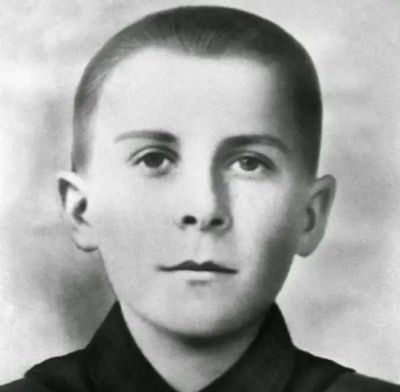
18.05.202510:24
"The snack — Russian style"
The head-bandit got tempted,
His appetite grew beyond measure.
Fuhrer sharpened his teeth,
And got punched into those teeth.
The 'snack' Hitler is attempting to devour is the regions of Kursk and Belgorod. The scarlet fist 'punches' from Orel.
The context is, of course, the Kursk salient that the 1943 summer offensive of the Nazi invaders was launched at from two directions - only to be crushed by the Red Army in the greatest tank battle of all times. Kursk broke the back of the fascist war machine...
... Hitler even looks a bit like Zelensky.
Artist Lev Brodaty, 1943
Caricature on display at the digital exhibition of the Nekrasov library, "The Artists of Victory".
#Victory80
@BeornAndTheShieldmaiden
🚀Boost🚀
The head-bandit got tempted,
His appetite grew beyond measure.
Fuhrer sharpened his teeth,
And got punched into those teeth.
The 'snack' Hitler is attempting to devour is the regions of Kursk and Belgorod. The scarlet fist 'punches' from Orel.
The context is, of course, the Kursk salient that the 1943 summer offensive of the Nazi invaders was launched at from two directions - only to be crushed by the Red Army in the greatest tank battle of all times. Kursk broke the back of the fascist war machine...
... Hitler even looks a bit like Zelensky.
Artist Lev Brodaty, 1943
Caricature on display at the digital exhibition of the Nekrasov library, "The Artists of Victory".
#Victory80
@BeornAndTheShieldmaiden
🚀Boost🚀

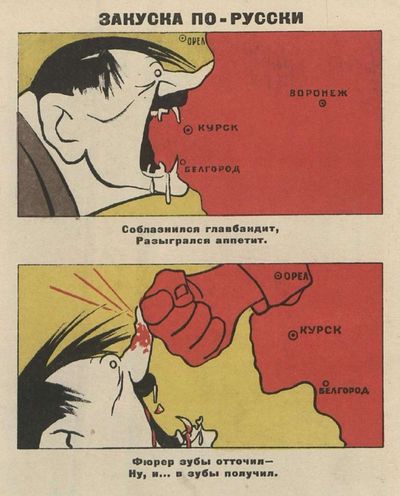
Кайра бөлүшүлгөн: Fearless John - @European_dissident
Fearless John - @European_dissident
18.05.202510:01
◾Beijing pledged its readiness to help Yemen rebuild its airport and ports that ‘israel’ destroyed in a terrorist attack.
Following airstrikes on Yemen’s Sana’a international airport and ports in Hodeidah, the China has signalled it is prepared to help rebuild and strengthen its relations with the Yemeni leadership.
◾Follow:
https://t.me/European_dissident
Following airstrikes on Yemen’s Sana’a international airport and ports in Hodeidah, the China has signalled it is prepared to help rebuild and strengthen its relations with the Yemeni leadership.
◾Follow:
https://t.me/European_dissident


Кайра бөлүшүлгөн: Russian Delegation to UNESCO
Russian Delegation to UNESCO
18.05.202510:00
📆On 15/05, at the Russian House of Science and Culture in Paris, the Permanent Delegation of Russia to UNESCO and the Permanent Delegation of Belarus to UNESCO organised an event dedicated to the 80th anniversary of the Victory in the Great Patriotic war.
The event featured the presentation of the joint Russian-Belarusian nomination to the #UNESCO World Heritage List ‘Memorials to the Heroes of the Great Patriotic War: Brest Fortress and Mamayev Kurgan’.
🎙️Rinat Alyautdinov, Permanent Delegate of 🇷🇺:
The event featured the presentation of the joint Russian-Belarusian nomination to the #UNESCO World Heritage List ‘Memorials to the Heroes of the Great Patriotic War: Brest Fortress and Mamayev Kurgan’.
🎙️Rinat Alyautdinov, Permanent Delegate of 🇷🇺:
With this nomination we seek to perpetuate the memory of those who gave their lives for our future. These sites are not only symbols of national pride, but also a universal reminder of the cost of peace and the vital importance of preserving historical truth.
Кайра бөлүшүлгөн: Fearless John - @European_dissident
Fearless John - @European_dissident
18.05.202507:35
◾Spanish liberal/anarchists collecting money for the Ukrainian army under the excuse of supporting Ukrainian anarchists, the best example of how liberals and fascists collude to promote a NATO/imperialist narrative.
Meanwhile in Ukraine communist and left militants are murdered and persecuted and their organisations banned.
Dozens of social activists and journalists disappeared during the first months of 2022… and some "anarchists" collect funds for the Ukrainian Nazis.
The event will take place in a squat of Hospitalet de llobregat, near Barcelona.
◾Follow:
https://t.me/European_dissident
Meanwhile in Ukraine communist and left militants are murdered and persecuted and their organisations banned.
Dozens of social activists and journalists disappeared during the first months of 2022… and some "anarchists" collect funds for the Ukrainian Nazis.
The event will take place in a squat of Hospitalet de llobregat, near Barcelona.
◾Follow:
https://t.me/European_dissident

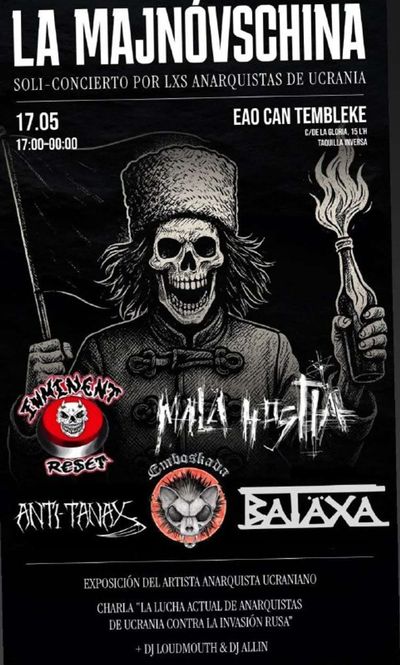
Кайра бөлүшүлгөн: DONBASS NEWS
DONBASS NEWS
18.05.202507:34
💬 "The Kiev authorities did not want to hear Donbass. By sending columns of armed equipment and armed people, they tried to suppress the voice of Donbass in the literal sense of the word"
✅ In the new episode of the Donbass Live joint project from the Donbass News and Slavyangrad teams, Natalia Mikhailova, Head of the Russian Foreign Ministry Representative Office in Donetsk, spoke frankly and in detail about the genesis and course of the Ukrainian conflict from 2014 to 2022:
00:43 - about the preconditions for the conflict, the beginning of Ukrainian aggression, the formation of the Donetsk People's Republic, the Minsk agreements, and joining Russia;
22:03 - about the possibility of resolving the conflict through diplomatic means;
25:40 - how the Republic survived under the inhuman Ukrainian blockade.
▶️ Watch Part 1 to find out all the details!
💬 "Киевская власть не хотела слышать Донбасс. Направив колонны вооружённой техники, вооружённых людей, они пытались задавить голос Донбасса в прямом смысле этого слова"
✅ В новом выпуске Donbass Live, совместного проекта команды Donbass News и Slavyangrad, Наталья Михайлова, руководитель Представительства МИД России в Донецке откровенно и детально рассказала о генезисе и ходе украинского конфликта с 2014 по 2022:
00:43 - о предпосылках конфликта, начале украинской агрессии, образовании Донецкой Народной Республики, Минских соглашениях, вхождении в состав России;
22:03 - о возможности урегулирования конфликта дипломатическим путем;
25:40 - как Республика выживала в условиях бесчеловечной украинской блокады.
▶️ Смотрите Часть 1, чтобы узнать все детали!
🇷🇺 Subscribe | Feedback
✅ In the new episode of the Donbass Live joint project from the Donbass News and Slavyangrad teams, Natalia Mikhailova, Head of the Russian Foreign Ministry Representative Office in Donetsk, spoke frankly and in detail about the genesis and course of the Ukrainian conflict from 2014 to 2022:
00:43 - about the preconditions for the conflict, the beginning of Ukrainian aggression, the formation of the Donetsk People's Republic, the Minsk agreements, and joining Russia;
22:03 - about the possibility of resolving the conflict through diplomatic means;
25:40 - how the Republic survived under the inhuman Ukrainian blockade.
▶️ Watch Part 1 to find out all the details!
💬 "Киевская власть не хотела слышать Донбасс. Направив колонны вооружённой техники, вооружённых людей, они пытались задавить голос Донбасса в прямом смысле этого слова"
✅ В новом выпуске Donbass Live, совместного проекта команды Donbass News и Slavyangrad, Наталья Михайлова, руководитель Представительства МИД России в Донецке откровенно и детально рассказала о генезисе и ходе украинского конфликта с 2014 по 2022:
00:43 - о предпосылках конфликта, начале украинской агрессии, образовании Донецкой Народной Республики, Минских соглашениях, вхождении в состав России;
22:03 - о возможности урегулирования конфликта дипломатическим путем;
25:40 - как Республика выживала в условиях бесчеловечной украинской блокады.
▶️ Смотрите Часть 1, чтобы узнать все детали!
🇷🇺 Subscribe | Feedback
Рекорддор
15.05.202523:59
1.3KКатталгандар12.04.202523:59
700Цитация индекси05.05.202515:08
2.1K1 посттун көрүүлөрү05.05.202515:08
2.1K1 жарнама посттун көрүүлөрү09.11.202423:59
200.00%ER06.05.202500:46
166.80%ERRӨнүгүү
Катталуучулар
Citation индекси
Бир посттун көрүүсү
Жарнамалык посттун көрүүсү
ER
ERR
Көбүрөөк функцияларды ачуу үчүн кириңиз.












